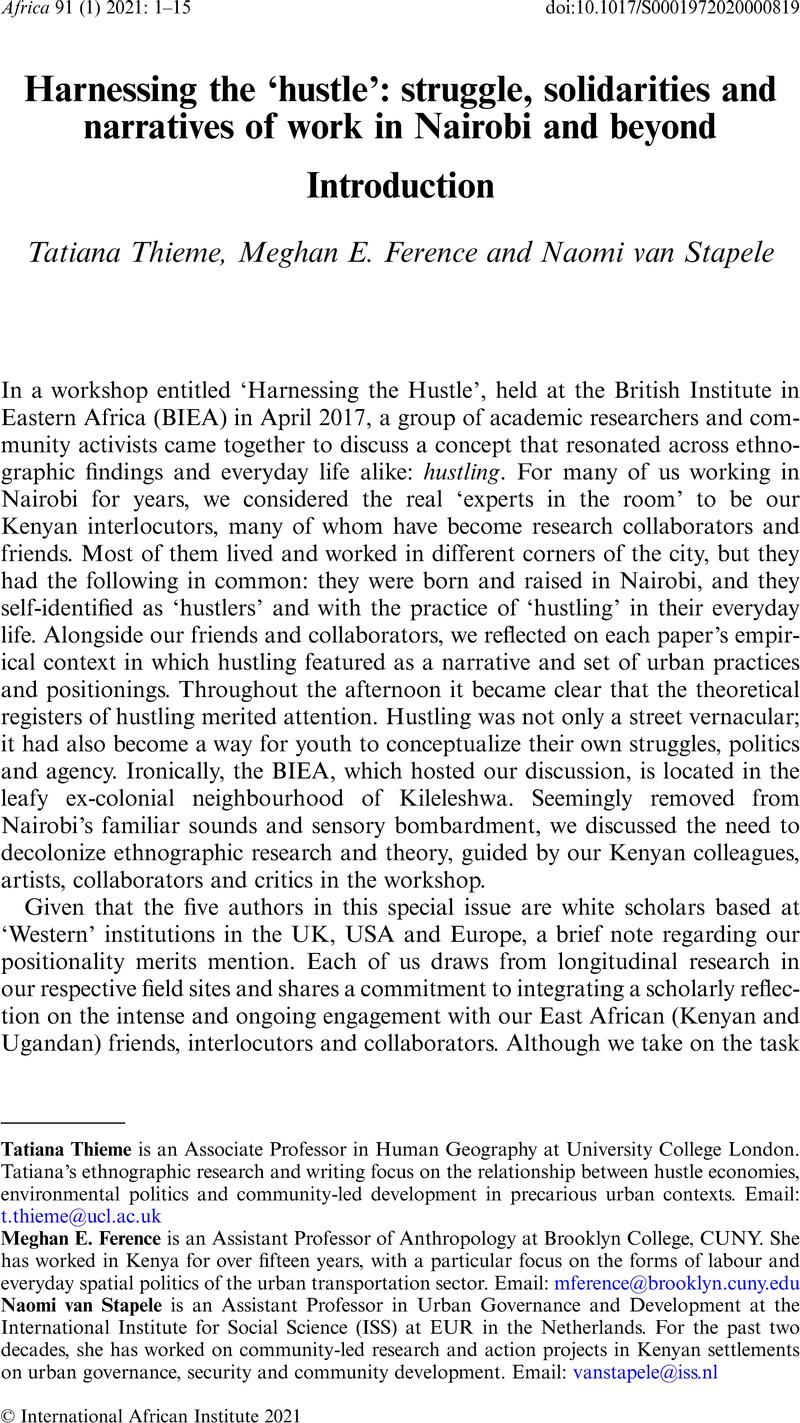Crossref Citations
This article has been cited by the following publications. This list is generated based on data provided by Crossref.
Thieme, Tatiana
2021.
‘Youth are redrawing the map’: temporalities and terrains of the hustle economy in Mathare, Nairobi.
Africa,
Vol. 91,
Issue. 1,
p.
35.
Monteith, William
and
Mirembe, George
2021.
‘We are taught to act’: hustling on the move in Kampala and Nairobi.
Africa,
Vol. 91,
Issue. 1,
p.
95.
Wiegratz, Jörg
Mujere, Joseph
and
Fontein, Joost
2022.
The case for oral histories of neoliberal Africa.
Third World Thematics: A TWQ Journal,
Vol. 7,
Issue. 4-6,
p.
199.
Moore, David
2022.
Déjà vu with difference: A Gramscian interpretation of Zimbabwe’s 2023 elections and their pasts.
Journal of African Elections,
Vol. 22,
Issue. 2,
p.
16.
Donovan, Kevin P.
and
Park, Emma
2022.
Knowledge/Seizure: Debt and Data in Kenya’s Zero Balance Economy.
Antipode,
Vol. 54,
Issue. 4,
p.
1063.
Champy, Muriel
2022.
Faire sa jeunesse dans les rues de Ouagadougou.
p.
307.
Langevang, Thilde
Steedman, Robin
Alacovska, Ana
Resario, Rashida
Kilu, Rufai H.
and
Sanda, Mohammed-Aminu
2022.
‘The show must go on!’: Hustling through the compounded precarity of Covid-19 in the creative industries.
Geoforum,
Vol. 136,
Issue. ,
p.
142.
Wairungu, Michael
Carotenuto, Matthew
and
Kibochi, Njau
2022.
African Homestays and Community Engagement: A Case Study on Reciprocity and Neocolonialism.
Frontiers: The Interdisciplinary Journal of Study Abroad,
Vol. 34,
Issue. 3,
p.
141.
2023.
The Urban Question in Africa.
p.
199.
Ndaka, Felix Mutunga
2023.
WakurugenziNetworks: Reframing Kenyan Vernaculars of Gender/Gendering in Abel Mutua’s YouTube Channel.
Eastern African Literary and Cultural Studies,
Vol. 9,
Issue. 1,
p.
19.
Guma, Prince K
Mwaura, Mwangi
Njagi, Eunice Wanjiku
and
Akallah, Jethron Ayumbah
2023.
Urban way of life as survival: navigating everyday life in a pluriversal global south.
City,
Vol. 27,
Issue. 3-4,
p.
275.
Fransen, Jan
Hati, Beatrice
Nyumba, Rosebella
and
van Tuijl, Erwin
2023.
Community vitality and frugal practices in informal settlements in Nairobi: Towards a typology.
Cities,
Vol. 134,
Issue. ,
p.
104179.
Bah, Abu Bakarr
and
Bangura, Ibrahim
2023.
Landholding and the Creation of Lumpen Tenants in Freetown: Youth Economic Survival and Patrimonialism in Postwar Sierra Leone.
Critical Sociology,
Vol. 49,
Issue. 7-8,
p.
1289.
Woensdregt, Lise
2023.
Going out and making it home: on the roots, routes and homing of young queer men in Nairobi, Kenya.
Mobilities,
Vol. 18,
Issue. 3,
p.
537.
Lockwood, Peter
2023.
‘He who relies on relatives and friends die poor’: class closure and stratagems of civility in peri‐urban Kenya.
Journal of the Royal Anthropological Institute,
Vol. 29,
Issue. 2,
p.
326.
Brankamp, Hanno
de Jong, Sara
Mackinder, Sophie
and
Devenney, Kelly
2023.
The camp as market frontier: Refugees and the spatial imaginaries of capitalist prospecting in Kenya.
Geoforum,
Vol. 145,
Issue. ,
p.
103843.
Ekdale, Brian
and
Aidoo, Ebenezer
2024.
Navigating platform work through solidarity and hustling: the case of ride-hailing drivers in Nairobi, Kenya.
Online Media and Global Communication,
Vol. 3,
Issue. 3,
p.
395.
Lanne, Jean-Baptiste
and
Morange, Marianne
2024.
Penser les citadinités depuis l’Afrique de l’Est.
EchoGéo,
Vol. 67,
Issue. ,
Rahier, Nick
2024.
‘Tarmackingis tedious': navigating city pressures in Nakuru, Kenya.
City,
p.
1.
Casciano, Davide
2024.
Compliance, Defiance, and ‘Dirty’ Luxury.
p.
353.




